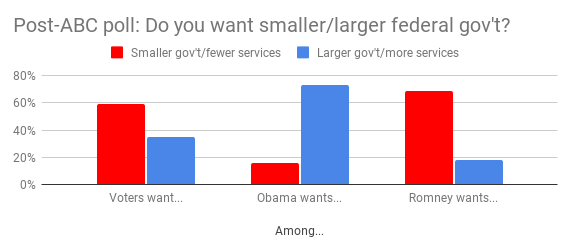Voters Want Smaller Government
The Washington Post reports today:
 The striking thing, of course, is that voters think Romney supports smaller government. It's not a conclusion they could draw from his fiscal record as governor, or from his Massachusetts health care plan, or from his current position on budget cuts, or even from his running mate's budget proposal. I think you have to conclude that voters believe Mitt Romney wants smaller government because President Obama keeps telling them so.
Voters have a better sense of Obama's own preferences: 73 percent say he wants larger government. You've got to wonder about the 15 percent who think he wants smaller government, though. Which words in that simple question do they not understand?
Meanwhile, I’ve always thought the “smaller government” question is incomplete. It offers respondents a benefit of larger government – "more services" – but it doesn’t mention that the cost of “larger government with more services” is higher taxes. The question ought to give both the cost and the benefit for each option. The Rasmussen poll does often ask the question that way. In fall 2010, when the Post poll showed 56 percent support for smaller government, a Rasmussen poll with the more balanced question found that 68 percent of voters said that they prefer smaller government with fewer services and lower taxes, while only 24 percent would rather see a more active government with more services and higher taxes. Along with other contemporaneous comparisons, it’s reasonable to conclude that if you remind respondents that “more services” means higher taxes, the margin by which people prefer smaller government rises by about 9 to 12 points.
And remember, swing voters support smaller government by even higher percentages.
The striking thing, of course, is that voters think Romney supports smaller government. It's not a conclusion they could draw from his fiscal record as governor, or from his Massachusetts health care plan, or from his current position on budget cuts, or even from his running mate's budget proposal. I think you have to conclude that voters believe Mitt Romney wants smaller government because President Obama keeps telling them so.
Voters have a better sense of Obama's own preferences: 73 percent say he wants larger government. You've got to wonder about the 15 percent who think he wants smaller government, though. Which words in that simple question do they not understand?
Meanwhile, I’ve always thought the “smaller government” question is incomplete. It offers respondents a benefit of larger government – "more services" – but it doesn’t mention that the cost of “larger government with more services” is higher taxes. The question ought to give both the cost and the benefit for each option. The Rasmussen poll does often ask the question that way. In fall 2010, when the Post poll showed 56 percent support for smaller government, a Rasmussen poll with the more balanced question found that 68 percent of voters said that they prefer smaller government with fewer services and lower taxes, while only 24 percent would rather see a more active government with more services and higher taxes. Along with other contemporaneous comparisons, it’s reasonable to conclude that if you remind respondents that “more services” means higher taxes, the margin by which people prefer smaller government rises by about 9 to 12 points.
And remember, swing voters support smaller government by even higher percentages.
Most Americans in a new Washington Post-ABC News poll want a shrunken federal government, and most believe Romney wants that too. ...Support for “smaller government” is up significantly in recent years, and marks a pivotal issue where voters view Obama as far out of step with public opinion.Here's a graph of what registered voters told the Post:
Posted on August 27, 2012 Posted to Cato@Liberty
Leave a comment
RSS feed for comments on this post.
Sorry, the comment form is closed at this time.
